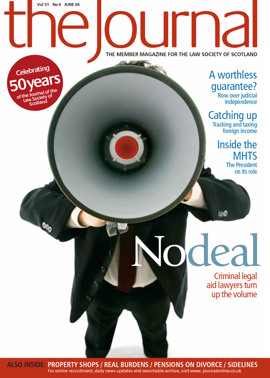The temporary judge survives

Science undone
Karl Popper, was it not, who used to say that you could not prove anything to be the case, only that it was not the case. This was his critique of scientific truth, that you might for example say that all swans are white, but then you go to Australia and find that some are black. This leaves you able to assert with confidence only that not all swans are black. Accordingly scientific progress is by way of proposing the best theory available on the evidence and then testing it to destruction.
These thoughts are prompted by the report of McGinty v HMA 2006 GWD 11-202, a successful appeal based on a change in what science thought to be the truth. As one does not know how many instances there are of convictions being based on what would now be regarded as bad science, it may be as well for the moment to stick to the matter in hand. The appellant had been convicted, inter alia, of being concerned in the supply of cannabis resin. The prosecution had relied on traces of cannabis found on banknotes discovered in the appellant’s bedroom. The case was referred by the Scottish Criminal Cases Review Commission.
The court’s attention was drawn to three matters. The first was a report by a doctor at a specialist laboratory which concluded that there had been deficiencies in the Crown evidence arising from the methodology used, and in particular that for there to be evidential value in the finding of traces of cannabis on the banknotes it would be necessary to know how this differed from those in circulation generally. The second was a memorandum signed by the head of chemistry and by the principal scientist at Strathclyde Police forensic laboratory, stating that in their opinion evidence obtained by the examination of money for drug contamination was “worthless and open to serious challenge”. Finally, the two original scientists no longer regarded their tests as being significant.
The appeal court quashed the conviction, holding that if the appeal was a “fresh evidence” one, the new evidence, which was recognised as not being available at the trial, disclosed a miscarriage of justice. The court also observed that it might not be necessary to deal with the matter in this way, because in any case it appeared that the evidence of the two scientists, which was significant, ought not to have been given at the original trial had they been fully abreast of contemporary research on the subject, and that as the evidence had been given the accused had not had a fair trial.
It would seem, therefore, that someone convicted on what one might loosely call ”scientific evidence”might have two routes to a successful appeal. One would be if it was discovered that what had previously been accepted as correct was proved, Popper-wise, to be wrong; the other if it could be shown that the original scientists had after all been wrong, at the time. It is not clear how those charged with defending in such circumstances should act: on one view they should carry out a periodic review of all scientific evidence resulting in conviction to see if it is still regarded as correct.
Approach to discounting
Appeals against unduly lenient sentences are comparatively few, so the report of HMA v Thomson 2006 GWD 11-205 may repay a visit. Two young men had been sentenced to periods of probation and to community service in respect of the assault to severe injury of two paramedics who had been called to treat a friend of theirs. The sentences complained of were quashed as insufficient and the cases continued. The appeal court held, first, that the sentences failed to reflect the gravity of the offences or to deter adequately and, secondly, that the sheriff had erred both in her approach to sentence discount and in her allowance of it. It was held that it was impossible to discern from the sheriff’s report what the allowance was, and further that the pleas had come not as the sheriff thought at the earliest opportunity but at the last minute. The case may be regarded as the coup de grace for the once-held view that all the sentencing judge was obliged to do was to state that the sentence would have been different but for the circumstances of the plea; now it appears necessary to state clearly what the base was as well as the discount awarded.
A real non-issue
Smart v HMA 2006 GWD 12-229 is of interest because it sees the appeal court disposing of a point that was, apparently, never a real issue at the trial. The case concerned the making of indecent photographs or pseudo-photographs of children and it was argued on appeal that the trial judge had failed to give adequate directions on the question of mens rea. However, as was pointed out, in the appellant’s own statement to police it was apparently inherent that he did possess the necessary intent. An appeal based on the trial judge’s alleged failure to deal with something not in dispute reminds one, for some reason, of the piece by Flann O’Brien about the Dublin judge who refuses to sit because there is not a policeman in court to prove the maps, even though the case he is due to try involves no maps.
Wrong turnings
And now to road traffic. Tedford v Dyer 2006 GWD 13-254 is a successful appeal against disqualification on the grounds that there were special reasons why this was not appropriate. It should be noticed that the reasons all relate to the circumstances in which the offence was committed and not to the anticipated consequences for the appellant or others. It seems that about 3.30 am the appellant had come upon a friend who had sustained a suspected broken leg and needed medical assistance as soon as possible. There was no telephone, mobile or other, available and the appellant reasonably believed that he was not over the limit, the blood reading being 82/80. The shortness of the journey was regarded as of little significance, which is perhaps not surprising as people are regularly disqualified for drink driving offences in which the distance travelled is (allegedly?) not far at all.
The case of Procurator Fiscal, Kirkcaldy v Klos (1 December 2005; unreported at time of writing) is a Crown appeal against acquittals on charges of culpable and reckless conduct (driving a motor car at 156 mph) and failing to give the correct identity of the driver to a police officer.
So far as the first charge was concerned, the court held that the sheriff erred in giving too much attention to the absence of evidence as to actual danger and not sufficient attention to the inherent quality of what the respondent was doing at the material time and to the foreseeable consequences of such actings. As respects the other charge, the court held that although the complaint specified a “wrong date”, the substance related to a single short incident and as time was not of the essence of the charge, the statutory latitude extended to the incident having happened on the day before that specified in the charge.
Temporary but independent
The most important constitutional law case recently involves the decision of the Privy Council in the “temporary judges” appeal. While it may not be cited every day in the summary courts, Kearney v HMA 2006 GWD 15-284 is thus clearly a major case. The appellant appealed against a refusal by the High Court to quash a number of convictions. It was argued that the appellant had been denied a fair trial as it had taken place before a judge who was not an independent and impartial tribunal having regard to the manner of his appointment and his term of office. It was further argued that the Lord Advocate, under section 57(2) of the Scotland Act, had no power to conduct a prosecution before a tribunal lacking independence and impartiality. The judge in question, a QC in private practice, had been appointed as a temporary judge for three years by the Scottish Ministers after consultation with the Lord President. His appointment was subsequently renewed for a further year.
The appeal was dismissed. It was held that a well-informed reasonable observer would be unlikely to consider that the judge was biased, and the fact that it was the Lord President, and not the Lord Advocate, who decided what work the judges would do, together with his security of tenure during the period of his appointment, was sufficient to meet the article 6(1) requirements of independence and impartiality.
Curiously enough, the High Court too had to consider the fairness and impartiality and the independence arguments recently in the case of Bryceland v HMA 2006 GWD 15-285. In that case the ground of appeal was that in an earlier appeal one member of the court had been the judge in an earlier deserted trial involving the appellant and had in fact refused bail to the appellant. So far as the subjective test went, it was held that a judge is presumed to be personally impartial until there was proof to the contrary, which there was not in the instant case. Further, applying the test of the fair minded and impartial observer, it was held that it was impossible to conclude that the judge was biased.
In this issue
- Independence first
- Stand up for our system
- The talking stops here
- The bill: a half measure
- Turning up the heat
- Strengthened or threatened?
- The patient approach
- Another little job
- The wars of the portals
- The LLP factor
- Avoiding surprises
- The temporary judge survives
- HMRC to the rescue
- Core of the agreement
- A debate to be resumed
- The impact of human rights
- Website reviews
- Book reviews
- Is that burden dead yet?






